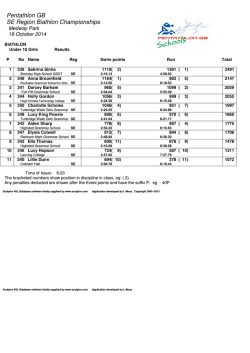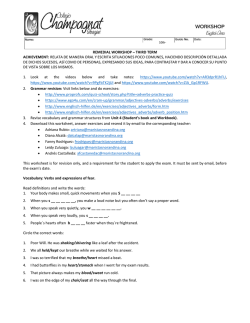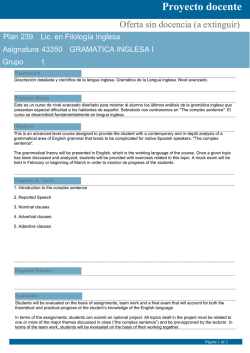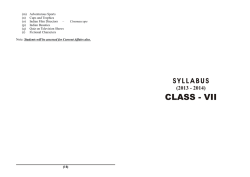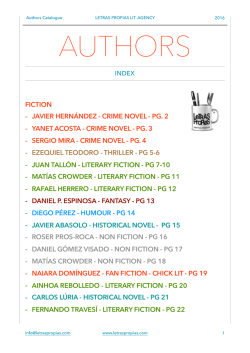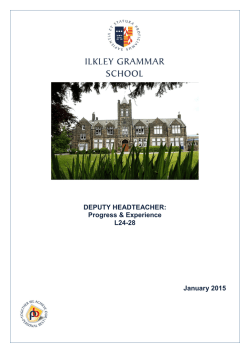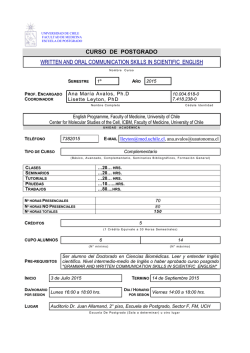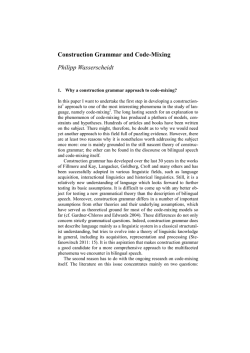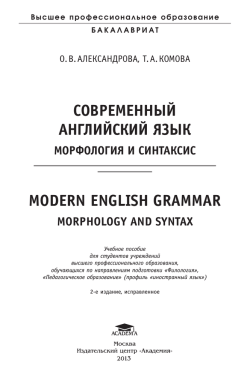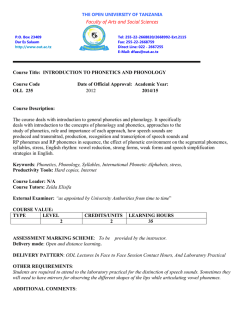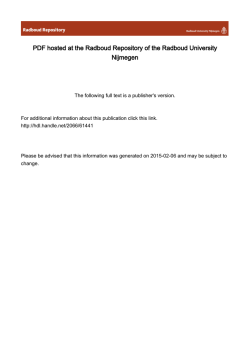
Modelo-guía copia
FACULTAD DE LETRAS / LETREN FAKULTATEA IRAKASKUNTZA-GIDA / GUÍA DOCENTE 01. Nombre de la asignatura: 25299 - Lengua Inglesa IV 02. Tipo de asignatura Obligatoria 03. Nº de créditos ECTS 6 04. Idioma de impartición Inglés 05. Objetivos formativos: This subject is the second one of two courses aimed at providing appropriate communicative situations in association with a number of training activities that will allow students: (i) to enlarge their vocabulary and repertoire of both advanced constructions and expressions, (ii) to strengthen their command of English grammar, (iii) to improve their pronunciation and intonation, and (iv) to distinguish between different registers of English as they progress towards a C1 level of competence in the language. 06. Competencias: Específicas del módulo M02CM01: Comprender textos escritos y orales de nivel C1. M02CM02: Producir textos escritos (incluidos textos de carácter académico) y orales de nivel C1. Específicas de la titulación (transversales) G008: Ser capaz de trabajar de forma autónoma y en equipo haciendo uso de las técnicas y herramientas adquiridas. Básicas (MEC) MEC3: Que los estudiantes tengan la capacidad de reunir e interpretar datos relevantes (normalmente dentro de su área de estudio) para emitir juicios que incluyan una reflexión sobre temas relevantes de índole social, científica o ética. MEC4: Que los estudiantes puedan transmitir información, ideas, problemas y soluciones a un público tanto especializado como no especializado. 07. Contenidos: 1. GRAMMAR: Discourse markers: adverbs and adverbial expressions; verb +object +infinitive or gerund; conditional sentences; permission, obligation, and necessity; verbs of the senses; gerunds and infinitives; speculation and deduction. 2. VOCABULARY: sounds and the human voice, history and warfare, compound adjectives, phone language, prefixes, place and movement, health and medicine. 3. PRONUNCIATION: consonant cluster; words with “silent” syllables, ea and ear, stress in word families, intonation and polite request, sounds and spelling, intonation in exclamations, extra stress on important words, word stress. 4. WRITING: A discursive essay; A report based on a novel. 5. READING: A selected novel. 6. SPEAKING: About a selected novel using the course grammar and vocabulary. 7. LISTENING: Focus on C1 level. 08. Modalidades docentes: Clases magistrales y prácticas de aula 09. Actividades de docencia-aprendizaje: Classes focus on speaking, listening, reading and writing skills as well as vocabulary, Paseo de la Universidad / Unibertsitateko Ibildea, 5 01006 Vitoria-Gasteiz FACULTAD DE LETRAS / LETREN FAKULTATEA grammar and pronunciation; each lesson will consist mainly of tasks designed around a communicative situation to help students improve their command of these skills and language components. Classes are interactive and student-centered. As the focus of the course is communication, a number of activities will be based on collaborative learning, thus, students will do different tasks with others to strengthen their communicative skills such as reading a novel, two individual reading aloud practice exercises based on the novel, and the recording of an interactive activity in groups based on the novel, but using the grammar and vocabulary specified in the content. Students will be encouraged to work both in the classroom – individually, in pairs and in groups – and at home. Students are expected to do out-of-class work in order to consolidate learning done in class. This out-of-class work includes both homework assigned in class and the students’ exposure to authentic language via extensive listening and reading for pleasure. 10. Proceso de evaluación por competencias y criterios: The type of assessment that will be implemented in this subject is what the Normativa de gestión para las enseñanzas grado y de primer y segundo ciclo of our University for the 2011/2012 academic year refers to as mixed assessment, that is, a combination of continuous assessment and a final examination. The assessment of student work will be progressive, formative and summative. Students will be assessed according to their performance in the following testing tasks. Continuous assessment: Individual assignment: - Reading aloud practice 10%: The proposal to practice speaking using BP. The video starts playing until the time for the selected reading text comes, at which point Babelium records the user's voice via the microphone and also image of his/her webcam. Just as in real life, the student has a limited time-frame to read the text. Students failing to come to class on the days appointed for these tests will receive no credit (0 marks) for the missed work. - Writing assignments 25%: Students will produce different pieces of writing. Two complete texts written in class will be given (for credit; students will receive correction of mistakes, feedback and a grade). Cooperative Project: - Spoken production task 25%: Students will carry out an interactive spoken activity. In groups, they will record a video-clip with a continuation to the selected story using the grammar and vocabulary from units 4 & 5 from New English File and uploaded to Babelium. They will have to show that (i) they know the relevant vocabulary to talk about that specific topic, (ii) they can use English grammar accurately, (iii) their pronunciation and intonation in English are good enough as to make themselves understood without difficulty, (iv) they can manage discourse markers and strategies competently, (v) they are creative, and (vi) that they have a good command of the conversation skills practiced in class. Final test - Final test 40%: The examination will consist of grammar, vocabulary and pronunciation exercises as well as a set of questions on a written text from the novel and a listening activity. Exam marking criteria: in every paper a pass is 50% of the total number of items. The final mark is an aggregate score of the total number of items in the exam. In order for the students to obtain a passing grade for the whole course, they must get a passing grade (50%) in the final exam. Only if the student passes the final exam the continuous assessment tasks will be added to the grade obtained in the exam. The exam plus the assessment tasks make up your final grade (100%). Those tasks which are not done will receive a zero mark. The marks obtained in the individual assignment and Paseo de la Universidad / Unibertsitateko Ibildea, 5 01006 Vitoria-Gasteiz FACULTAD DE LETRAS / LETREN FAKULTATEA cooperative project work will be kept for the 2nd exam call in June. 11. Materiales de uso obligatorio: OXENDEN, Clive and Christina LATHAM-KOENIG. 2010. New English File (advanced). Student's book. Oxford: OUP. OXENDEN, Clive and Christina LATHAM-KOENIG. 2010. New English File (advanced. Workbook. Oxford: OUP. Selected novel 12. Bibliografía: 12.1. Bibliografía básica HEWINGS, Martin. 2005. Advanced grammar in use. A self-study reference and practice book for advanced students of English with answers. Cambridge: CUP. SWAN, M. 2005. Practical English Usage. Oxford: OUP. 13. Observaciones: 1. In order for the students to obtain a passing grade for the whole course, they must get a passing grade (50%) in the final exam. In other words, only if the student passes the final exam will the partial grades be added to the grade obtained in the exam. 2. The students assessed in June will be evaluated on the basis of a final examination that will count as 100% of the final grade. This examination will consist of grammar, vocabulary and pronunciation exercises, an individual oral production task based on the novel, a piece of writing, a set of questions on a written text and a listening activity. Those students referred to in article 43.1 of the Normativa de gestión para las enseñanzas grado y de primer y segundo ciclo of our University for the 2011/2012 academic year must contact the instructor within the first two weeks of the course and hand in the documentation that proves that their professional or family situation exempts them from mixed assessment. In these cases, and these cases alone, a comprehensive final examination that will be worth 100% of the final grade will be held on the assigned date. This examination will consist of grammar, vocabulary and pronunciation exercises, an individual oral production task based on the novel, a piece of writing, a set of questions on a written text and a listening activity. Part A: regular exam (50%) Part B: written text (20%) Part C: reading aloud practice (10%) Part D: oral task based on the novel (20%) Paseo de la Universidad / Unibertsitateko Ibildea, 5 01006 Vitoria-Gasteiz
© Copyright 2026
